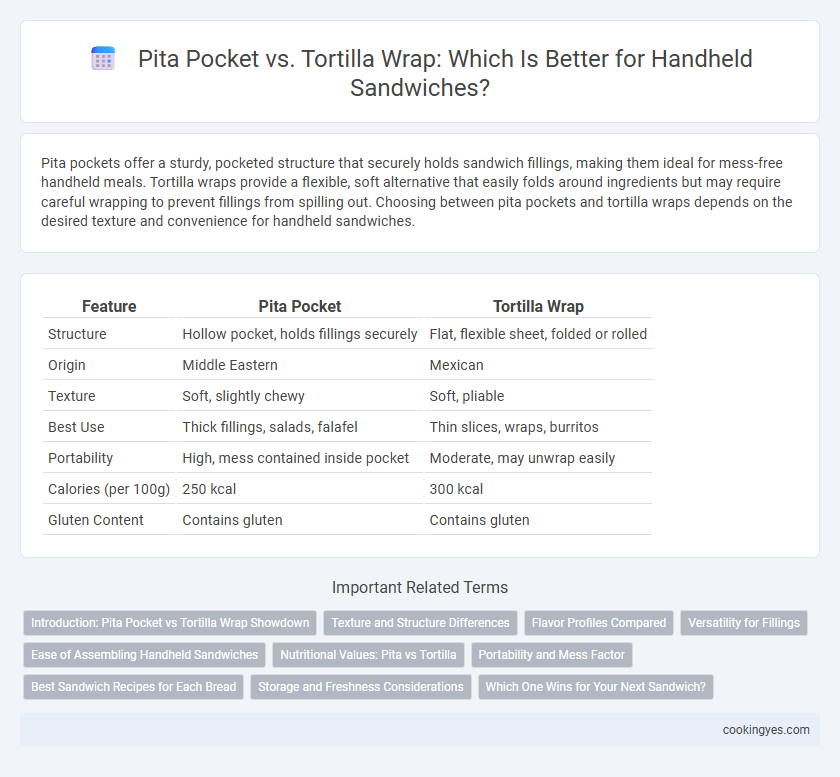Pita pockets offer a sturdy, pocketed structure that securely holds sandwich fillings, making them ideal for mess-free handheld meals. Tortilla wraps provide a flexible, soft alternative that easily folds around ingredients but may require careful wrapping to prevent fillings from spilling out. Choosing between pita pockets and tortilla wraps depends on the desired texture and convenience for handheld sandwiches.
Table of Comparison
| Feature | Pita Pocket | Tortilla Wrap |
|---|---|---|
| Structure | Hollow pocket, holds fillings securely | Flat, flexible sheet, folded or rolled |
| Origin | Middle Eastern | Mexican |
| Texture | Soft, slightly chewy | Soft, pliable |
| Best Use | Thick fillings, salads, falafel | Thin slices, wraps, burritos |
| Portability | High, mess contained inside pocket | Moderate, may unwrap easily |
| Calories (per 100g) | 250 kcal | 300 kcal |
| Gluten Content | Contains gluten | Contains gluten |
Introduction: Pita Pocket vs Tortilla Wrap Showdown
Pita pockets offer a sturdy, pocket-like structure made from leavened wheat bread, ideal for holding various fillings without spillage. Tortilla wraps, typically thinner and more flexible, provide a versatile flatbread option that can be rolled tightly for easy handheld consumption. Both options deliver unique textures and flavors, influencing sandwich preparation and eating experience.
Texture and Structure Differences
Pita pockets feature a thicker, pocket-like structure that holds fillings securely without leaking, offering a chewy texture that complements hearty ingredients. Tortilla wraps are thin and flexible, allowing for tight rolling and easy handheld consumption but may soften quickly when filled with moist ingredients. The choice between pita and tortilla depends on desired bite firmness and filling containment during eating.
Flavor Profiles Compared
Pita pockets offer a slightly tangy and yeasty flavor with a chewy texture that complements Mediterranean fillings like hummus, falafel, and grilled veggies. Tortilla wraps provide a mild, neutral taste with a soft and pliable texture, allowing bold and spicy ingredients such as grilled chicken, salsa, and avocado to shine. Flavor profiles differ significantly, with pita adding a rustic zest and tortilla emphasizing versatility and balance.
Versatility for Fillings
Pita pockets offer a unique pocket structure that holds fillings securely, making them ideal for ingredients like falafel, grilled vegetables, and creamy spreads. Tortilla wraps provide a flexible, flat surface that accommodates diverse fillings such as sliced meats, beans, and fresh greens, allowing for easy folding and rolling. Both options excel in versatility, but pita pockets excel in containing chunky, saucy fillings, while tortillas adapt better to layered and tightly wrapped combinations.
Ease of Assembling Handheld Sandwiches
Pita pockets provide a natural pocket structure that simplifies stuffing ingredients evenly without the risk of fillings spilling out, enhancing ease of assembly for handheld sandwiches. Tortilla wraps require careful folding and wrapping techniques to secure fillings, which can be more time-consuming and challenging to maintain for on-the-go eating. The sturdy yet flexible nature of pita pockets makes them a preferred choice for quick and mess-free sandwich assembly.
Nutritional Values: Pita vs Tortilla
Pita pockets generally contain fewer calories and less fat than traditional flour tortillas, making them a lighter option for handheld sandwiches. While both pita and tortillas provide a good source of carbohydrates and some protein, pita often offers higher fiber content due to its dense, pocketed structure. For those monitoring sodium intake, authentic pita bread typically has lower sodium levels compared to many store-bought tortillas.
Portability and Mess Factor
Pita pockets offer superior portability due to their compact, enclosed structure that securely holds fillings without spilling, making them ideal for on-the-go sandwiches. Tortilla wraps provide flexibility but tend to be messier, as their open-ended design can lead to fillings slipping out during eating. Choosing pita pockets reduces mess and enhances convenience, especially when transport and ease of consumption are priorities.
Best Sandwich Recipes for Each Bread
Pita pockets offer a sturdy, pocket-like structure ideal for holding hearty fillings like falafel, grilled chicken, and fresh veggies, making them perfect for Mediterranean and Middle Eastern-inspired sandwiches. Tortilla wraps provide a flexible, thin base that works excellently for rolled sandwiches or wraps filled with ingredients such as turkey, avocado, cheese, and crisp lettuce, commonly seen in Southwestern and Tex-Mex recipes. Choosing the right bread enhances the sandwich experience by complementing the texture and flavors of the fillings, ensuring optimal taste and portability.
Storage and Freshness Considerations
Pita pockets maintain freshness longer due to their enclosed pocket structure, which helps retain moisture and prevents fillings from leaking during storage. Tortilla wraps require careful wrapping and refrigeration to avoid drying out, as their thin, flat nature makes them more prone to staleness and breakage. Proper airtight storage extends the shelf life of both, but pita pockets generally provide a more reliable barrier against air exposure for handheld sandwiches.
Which One Wins for Your Next Sandwich?
Pita pockets offer a sturdy, pocketed structure that holds fillings securely, making them ideal for hearty, mess-free handheld sandwiches. Tortilla wraps provide a flexible, thin alternative that easily folds around diverse ingredients, perfect for customizable and portable wraps. For your next sandwich, choose pita pockets for stability and volume or tortilla wraps for versatility and lightness in handheld convenience.
Pita pocket vs Tortilla wrap for handheld sandwich Infographic

 cookingyes.com
cookingyes.com